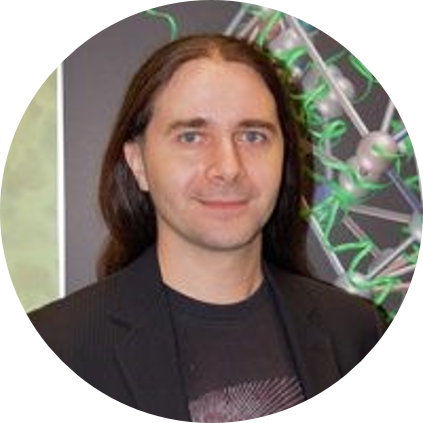
Catalysts Webinar | Recent Advances in Computational Catalysis II
27 January 2021, 00:00
Computational catalysis, Molecular Modeling, Kinetics, DFT calculations, Simulation, Theoretical Modeling, Structure-functional analysis, Quantum Chemistry
Webinar Information
5th Webinar Series on Catalysts - an Open Access Journal
Recent Advances in Computational Catalysis II
Computational catalysis has been one of the most dynamic research fields over the last decade, and it now represents a critical tool for the analysis of chemical mechanisms and active sites. The growth in this area has been accelerated by steady improvements in computational speed and a maturation of robust software tools, providing opportunities for more realistic models and the application of powerful analysis techniques. As the field of computational catalysis continues to expand, the gap between model and reality is beginning to narrow. More effort is now focused on capturing secondary effects (structural defects, solvation environment, deactivation events, thermal distortions, etc.), extending the time scales, and incorporating machine learning and descriptor-based methods for catalyst screening.
Chair: Prof. Dr. C. Heath Turner
Date & Time: 27 January 2021 9:00 am CST | 4:00 pm CET
Webinar ID: 885 1713 9510
Webinar Secretariat: catalysts.webinar@mdpi.com
The following experts will present and speak:
|
Prof. Dr. C. Heath Turner |
Prof. Turner completed his Ph.D. in Chemical Engineering from NC State University. He spent several years in industry with Monsanto, Birmingham Steel, and Trinity Consultants. He joined The University of Alabama as an assistant professor in 2003, and he is now a Professor and the Department Head of Chemical and Biological Engineering, and Director of the UA Poly-SM Initiative. Over the past few years, he has been a visiting Faculty Fellow at NASA-Langley, the Naval Research Lab, and the Air Force Research Lab, Visiting Professor at Vanderbilt University, and an International Distinguished Professor at Shanghai University of Engineering Science. His current research is focused on developing kinetic Monte Carlo (KMC) simulation techniques for extending the time and length scales of atomistic simulation models for catalytic systems. This involves applications to catalysis, electrocatalysis, and tribochemical reactions. |
|
Prof. Dr. Gregori Ujaque |
Gregori Ujaque obtained his Ph.D. in Chemistry from the Universitat Autònoma de Barcelona (UAB) in 1999 on the field of computational homogeneous catalysis under the supervision of Profs. A. Lledós and F. Maseras. He then spent a couple of years at the University of California, Los Angeles (UCLA) with Prof. K.N. Houk, working on the rational design of catalytic antibodies and organic reactivity using computational chemistry. He returned to UAB contracted by the “Ramon y Cajal” program, obtaining a permanent position in 2007. His main interests are the application of computational methods to the understanding of catalysis, using mainly QM and QM/MM methods in combination with AIMD and QM/MM-MD methods. He enjoys working on catalytic processes such as C–C or C–N cross-coupling, and hydrogenation or hydroamination reactions, among others. Several metal catalysts have been the objectives of his studies, with gold occupying a prominent position, but focusing also on first row transition metals and main group elements. His interests have recently broadened to modeling Supramolecular Catalysis. He served as associated editor of “Anales de Química”, the journal of the Spanish Chemical Society. Nowadays he is the President of the Catalan Chemical Society (SCQ). |
|
Dr. José R. B. Gomes |
José R. B. Gomes is a Principal Researcher at the CICECO-Aveiro Institute of Materials, University of Aveiro, Portugal. He graduated in chemistry from the University of Porto (Portugal), from where he also received his Ph.D. in 2000 on the topic of computational heterogeneous catalysis under the supervision of José A. N. F. Gomes. He performed post-doctoral work in the groups of Francesc Illas and Manuel A. V. Ribeiro da Silva at the Universities of Barcelona (Spain) and Porto. He is the recipient of the Vicente de Seabra medal (2010) from the Portuguese Chemical Society (SPQ). His interests include computational studies of interactions and the reactions of molecules at interfaces, as well as of the structural and spectroscopic properties of molecular systems. |
|
Dr. Konstantinos D. Vogiatzis
|
Konstantinos "Kostas" Vogiatzis graduated from the Hellenic-American Educational Foundation and completed his B.S. in chemistry at the University of Athens, in 2006. He obtained his MSc in Applied Molecular Spectroscopy from the University of Crete, in 2008, where he worked on theoretical studies of the interactions of CO2 with nanomaterials in the research group of Prof. George Froudakis. He received his Ph.D. in 2012 from the Karlsruhe Institute of Technology, where he developed a highly accurate quantum chemical method under the supervision of Prof. Wim Klopper. After an eight-month post-doctoral appointment at the Institute of Nanotechnology at the Karlsruhe Institute of Technology, he moved in 2014 to the University of Minnesota (UMN), where he performed post-doctoral research in the group of Prof. Laura Gagliardi. His research at the UMN focused on the catalytic and sorption properties of metal–organic frameworks (MOFs), and on the development and application of strongly correlated methods. In 2016, Dr. Kostas Vogiatzis joined the University of Tennessee, Knoxville, as an assistant professor of theoretical and computational chemistry. His research group is currently developing new computational methods based on electronic structure theory and machine learning for the theoretical examination of reactivity. |
Program
The webinar will start at 9:00 am (CST) 27 January 2021 and will last maximum 1 hour and a half.
|
Presentation |
Time |
|
Prof. Dr. Turner Introduction |
9:00 am (CST) | 4:00 pm (CET) |
|
Prof. Dr. Ujaque Binding and Rate Acceleration by a [M4L6 ]12− Metal Organic Cage |
9:05 am (CST) | 4:05 pm (CET) |
|
Dr. Gomes The Potential of MXenes for Catalysis from a Computational Point of View |
9:25 am (CST) | 4:25 pm (CET) |
|
Dr. Vogiatzis Exploring Catalysis with Quantum Chemistry and Machine Learning |
9:45 am (CST) | 4:45 pm (CET) |
| Q&A |
10:05 am (CST) | 5:05 pm (CET) |
Webinar Content
On Wednesday, 27th January, MDPI and the Journal Catalysts organized the 5th webinar on Catalysts, entitled: “Recent Advances in Computational Catalysis II"
The introduction was held by the chair of the webinar, Prof. Dr. C. Heath Turner. Prof. Dr. C. Heath Turner is Professor and the Department Head of Chemical and Biological Engineering at the University of Alabama, and Director of the UA Poly-SM Initiative. His current research is focused on developing kinetic Monte Carlo (KMC) simulation techniques for extending the time and length scales of atomistic simulation models for catalytic systems.
Prof. Dr. Ujaque held the first presentation, which was entitled “Binding and Rate Acceleration by a [M4L6 ]12− Metal Organic Cage”. He obtained his Ph.D. in Chemistry from the Universitat Autònoma de Barcelona (UAB) and has a permanent position as Professor there since 2007. His main interests are the application of computational methods to the understanding of catalysis, using mainly QM and QM/MM methods in combination with AIMD and QM/MM-MD methods.
The second presentation with the title “The Potential of MXenes for Catalysis from a Computational Point of View” was held by Dr. José R. B. Gomes. Dr. Gomes is a Principal Researcher at the CICECO-Aveiro Institute of Materials, University of Aveiro, Portugal. His interests include computational studies of interactions and the reactions of molecules at interfaces, as well as of the structural and spectroscopic properties of molecular systems.
The third speaker of the webinar was Dr. Konstantinos D. Vogiatzis. His presentation was entitled: “Exploring Catalysis with Quantum Chemistry and Machine Learning.” Dr. Konstantinos D. Vogiatzis joined the University of Tennessee, Knoxville, as an assistant professor of theoretical and computational chemistry in 2016. His research group is currently developing new computational methods based on electronic structure theory and machine learning for the theoretical examination of reactivity.
Their presentations were followed by a Q &A and a discussion, moderated by the chair. The webinar was offered via Zoom and required registration to attend. The full recording can be found here on Sciforum website. In order to stay updated on the next webinars on Catalysts, be sure to sign up for our newsletter by clicking on “Subscribe” at the top of the page.
Relevant Special Issues
10th Anniversary of Catalysts: Achievements in Computational Catalysis Techniques and Applications
Guest Editors: C. Heath Turner and Tibor Szilvási
Accepting submissions until 15 July 2021
Catalysts for Structure-Functional Analysis and Enzyme Optimization
Guest Editors: Anna A. Kulminskaya and Vladimir V. Egorov
Accepting submissions until 15 April 2021
Mathematical Modeling and Simulation of Catalytic Processes for Sustainable Energy Conversion and Environmental Applications
Guest Editors: Gaetano Continillo and Katarzyna Bizon
Accepting submissions until 30 April 2021
Theoretical Modeling of Catalytic Processes: Challenges, Applications and Perspectives
Guest Editors: Olga S. Bokareva and Pavel Gurikov
Accepting submissions until 15 July 2021
Modeling of the Catalytic Cracking
Guest Editor: Elena N. Ivashkina and Emiliya D. Ivanchina
Accepting submissions until 15 August 2021
New Advances in Surface-Mediated Catalysis
Guest Editor: Francesc Viñes Solana, Ángel Morales-García and José R. B. Gomes
Accepting submissions until 31 August 2021










